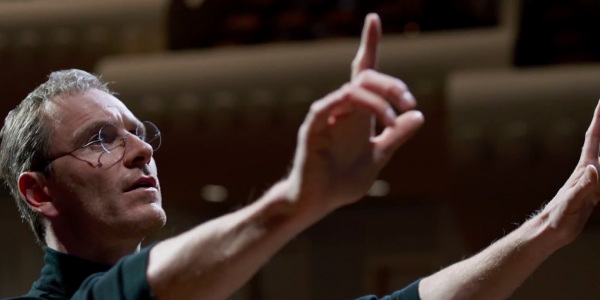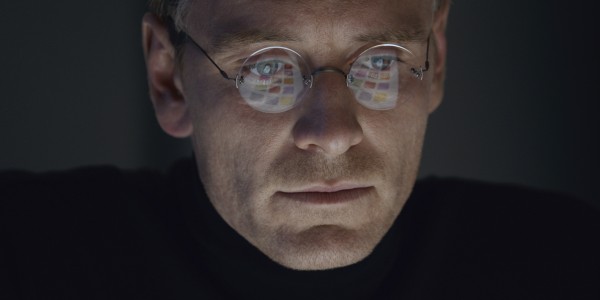Steve Jobs Review
"God sent his own son in a suicide mission, but we like him anyway because he made trees."
The world remains fascinated by Steve Jobs. Only four years have passed since his untimely death from cancer in 2011, but the genius behind Apple has already been the subject of three movies. Ashton Kutcher got there first with a run-of-the-mill biopic which hardly anyone saw and, the few who did, have forgotten already. Alex Gibney's (
Going Clear, The Armstrong Lie) documentary entitled
Steve Jobs: The Man in the Machine is currently touring the festival circuit, but the big one is the Sorkin-scripted, Boyle-directed, Fassbender-starring, Oscar-baiting
Steve Jobs.
 Steve Jobs
Steve Jobs is a rigidly orchestrated theatrical dramatisation rather than a traditional biopic. The film plays out in three acts. Each segment whizzes by in real time, as Steve Jobs prepares for a different product launch - the Mac in 1984, the NeXT computer in 1988 and the iMac in 1998. Six key people in his life are present in the green room before each event. A huge dramatic contrivance, sure, but it provides a snapshot of the man underneath the turtleneck (metaphorically speaking). The film is neither a celebration nor a condemnation of the controversial figure. Megalomania and genius go hand in hand as he compares himself to Bob Dylan, Julius Caesar, Marilyn Monroe and God without a hint of irony. Meanwhile he struggles to be a father to his daughter Lisa.
Your enjoyment of
Steve Jobs will depend on your opinion of its superstar-screenwriter Aaron Sorkin (
The Social Network, The West Wing). His style is all over the movie. Sorkin is a master of quickfire dialogue, pompous metaphors and the infamous walk-and-talk. In
Jobs he takes his tropes to a whole new level, to the verge of self-parody. You can easily picture Sorkin's self-satisfied grin as he smashes page after page into the keyboard. His words are clearly brilliant and smart, but I'm not sure they have enough substance to make up for their alienating effect. As a result, the film, not unlike
Birdman, walks a thin line between greatness and self-important arrogance. Ironically appropriate given the subject, this is nevertheless sometimes hard to watch. The fact that Sorkin cannot find an ending does not help.

The A-list cast makes it all worthwhile. Michael Fassbender seemed like an odd choice to play Jobs a few months ago, but he completely disappears in the role. His uncompromising performance marks a new high in an already stellar career. His energy makes you forget what the real Steve Jobs looked and sounded like. It is hard to imagine what Christian Bale would have done with the role, but he could hardly have been better. Kate Winslet also rises to the occasion as Jobs' marketing executive, confidant, and friend Joanna Hoffman. She provides common sense and groundedness when Steve Jobs (or Aaron Sorkin) threaten to spin out of orbit completely. Jeff Daniels, Michael Stuhlbarg, Seth Rogen and Katherine Waterston also provide ample support.
Danny Boyle infuses the film with technical and visual flair. The Oscar-winner's filmmaking-style is always distinguished by energy and movement, which flows at once against and with Sorkin's words. The writer somewhat outshines the director, but Danny Boyle manages to put his own stamp on the film. The editing is a sublime achievement. Instead of traditional flashbacks, the film cuts back an forth between two conversations taking place in different locations and periods on several occasions. Both exchanges remain coherent and understandable. The intertwining of timelines is a clever way to keep the momentum in the present going while adding information from the past.
Steve Jobs, like the NeXT computer, may not add up to the sum of its parts, but it looks nice and keeps us entertained for a while.
Pros
- Michael Fassbender disappears in the role
- Danny Boyle's visual energy
- Clever combination of film stock and digital
- Editing across time periods works perfectly
Cons
- Sorkin's incessant dialogue can grate
- Saccharine non-ending
 Steve Jobs is a rigidly orchestrated theatrical dramatisation rather than a traditional biopic. The film plays out in three acts. Each segment whizzes by in real time, as Steve Jobs prepares for a different product launch - the Mac in 1984, the NeXT computer in 1988 and the iMac in 1998. Six key people in his life are present in the green room before each event. A huge dramatic contrivance, sure, but it provides a snapshot of the man underneath the turtleneck (metaphorically speaking). The film is neither a celebration nor a condemnation of the controversial figure. Megalomania and genius go hand in hand as he compares himself to Bob Dylan, Julius Caesar, Marilyn Monroe and God without a hint of irony. Meanwhile he struggles to be a father to his daughter Lisa.
Your enjoyment of Steve Jobs will depend on your opinion of its superstar-screenwriter Aaron Sorkin (The Social Network, The West Wing). His style is all over the movie. Sorkin is a master of quickfire dialogue, pompous metaphors and the infamous walk-and-talk. In Jobs he takes his tropes to a whole new level, to the verge of self-parody. You can easily picture Sorkin's self-satisfied grin as he smashes page after page into the keyboard. His words are clearly brilliant and smart, but I'm not sure they have enough substance to make up for their alienating effect. As a result, the film, not unlike Birdman, walks a thin line between greatness and self-important arrogance. Ironically appropriate given the subject, this is nevertheless sometimes hard to watch. The fact that Sorkin cannot find an ending does not help.
Steve Jobs is a rigidly orchestrated theatrical dramatisation rather than a traditional biopic. The film plays out in three acts. Each segment whizzes by in real time, as Steve Jobs prepares for a different product launch - the Mac in 1984, the NeXT computer in 1988 and the iMac in 1998. Six key people in his life are present in the green room before each event. A huge dramatic contrivance, sure, but it provides a snapshot of the man underneath the turtleneck (metaphorically speaking). The film is neither a celebration nor a condemnation of the controversial figure. Megalomania and genius go hand in hand as he compares himself to Bob Dylan, Julius Caesar, Marilyn Monroe and God without a hint of irony. Meanwhile he struggles to be a father to his daughter Lisa.
Your enjoyment of Steve Jobs will depend on your opinion of its superstar-screenwriter Aaron Sorkin (The Social Network, The West Wing). His style is all over the movie. Sorkin is a master of quickfire dialogue, pompous metaphors and the infamous walk-and-talk. In Jobs he takes his tropes to a whole new level, to the verge of self-parody. You can easily picture Sorkin's self-satisfied grin as he smashes page after page into the keyboard. His words are clearly brilliant and smart, but I'm not sure they have enough substance to make up for their alienating effect. As a result, the film, not unlike Birdman, walks a thin line between greatness and self-important arrogance. Ironically appropriate given the subject, this is nevertheless sometimes hard to watch. The fact that Sorkin cannot find an ending does not help.
 The A-list cast makes it all worthwhile. Michael Fassbender seemed like an odd choice to play Jobs a few months ago, but he completely disappears in the role. His uncompromising performance marks a new high in an already stellar career. His energy makes you forget what the real Steve Jobs looked and sounded like. It is hard to imagine what Christian Bale would have done with the role, but he could hardly have been better. Kate Winslet also rises to the occasion as Jobs' marketing executive, confidant, and friend Joanna Hoffman. She provides common sense and groundedness when Steve Jobs (or Aaron Sorkin) threaten to spin out of orbit completely. Jeff Daniels, Michael Stuhlbarg, Seth Rogen and Katherine Waterston also provide ample support.
Danny Boyle infuses the film with technical and visual flair. The Oscar-winner's filmmaking-style is always distinguished by energy and movement, which flows at once against and with Sorkin's words. The writer somewhat outshines the director, but Danny Boyle manages to put his own stamp on the film. The editing is a sublime achievement. Instead of traditional flashbacks, the film cuts back an forth between two conversations taking place in different locations and periods on several occasions. Both exchanges remain coherent and understandable. The intertwining of timelines is a clever way to keep the momentum in the present going while adding information from the past.
Steve Jobs, like the NeXT computer, may not add up to the sum of its parts, but it looks nice and keeps us entertained for a while.
The A-list cast makes it all worthwhile. Michael Fassbender seemed like an odd choice to play Jobs a few months ago, but he completely disappears in the role. His uncompromising performance marks a new high in an already stellar career. His energy makes you forget what the real Steve Jobs looked and sounded like. It is hard to imagine what Christian Bale would have done with the role, but he could hardly have been better. Kate Winslet also rises to the occasion as Jobs' marketing executive, confidant, and friend Joanna Hoffman. She provides common sense and groundedness when Steve Jobs (or Aaron Sorkin) threaten to spin out of orbit completely. Jeff Daniels, Michael Stuhlbarg, Seth Rogen and Katherine Waterston also provide ample support.
Danny Boyle infuses the film with technical and visual flair. The Oscar-winner's filmmaking-style is always distinguished by energy and movement, which flows at once against and with Sorkin's words. The writer somewhat outshines the director, but Danny Boyle manages to put his own stamp on the film. The editing is a sublime achievement. Instead of traditional flashbacks, the film cuts back an forth between two conversations taking place in different locations and periods on several occasions. Both exchanges remain coherent and understandable. The intertwining of timelines is a clever way to keep the momentum in the present going while adding information from the past.
Steve Jobs, like the NeXT computer, may not add up to the sum of its parts, but it looks nice and keeps us entertained for a while.